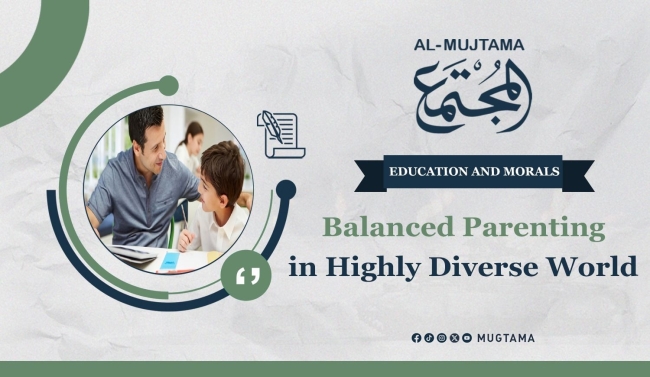Family is the first institution where a child is born and learns moral foundations through daily interactions with and around them. The child imitates what their parents do, deriving their values from them. In our contemporary world, characterized by increasing cultural, religious, and social diversity, instilling fundamental values has become essential. It is necessary to raise a generation capable of coexisting in a diverse and harmonious society. However, it is not an easy task.
Instilling good morals, such as honesty and sincerity, is admirable. Yet, children must also be prepared to face a world where they may encounter deceit and betrayal, or differing religious beliefs, or varying customs and traditions. Otherwise, their personality may clash with the multifaceted realities of life, leaving them feeling hindered by their differences, and unable to integrate into society. This could lead them either to abandon some of their principles to feel a sense of belonging or to isolate themselves from the world.
Differences and Diversity
No two people are entirely alike. People differ in appearance, voices, clothing, traditions, cultural backgrounds, religious beliefs, practices, abilities, and even lifestyles and families. Hence, it is crucial to teach children that these differences are not only natural but also a source of diversity that makes the world more beautiful and exciting.
Children often notice the differences around them and ask innocent questions about them, such as "Why is this person sitting in a wheelchair?", "Why is that person's skin color different from mine?", or "Why is that person wearing clothes different from ours?".
At a young age, children accept differences easily and without judgment. They may form friendships with peers who are culturally, physically, or family-wise different from them. However, as they grow older, their opinions begin to form under the influence of those around them, especially their parents. Therefore, the way parents handle differences significantly shapes how children perceive others who are different from them.
Parents Role in Instilling Acceptance
1. Being a Good Role Model:
Leading by example is one of the most effective ways to teach children the values of tolerance and respect. Children, particularly in their early years, are directly influenced by their parents' actions and behavior more than by words or lectures. If a child observes their parents treating others with respect, regardless of their differences, this behavior becomes a natural model for the child to emulate.
2. Discussion and Interaction:
Open discussions between parents and children are a powerful tool for fostering the values of acceptance and understanding differences. Children are naturally curious and ask innocent questions about the world around them, including differences among people. Turning these questions into learning opportunities can profoundly impact the child’s personality development.
3. Promoting Respect and Appreciation:
Respect involves acknowledging others' value and dignity and treating them kindly while appreciating their feelings, opinions, and rights. Respect fosters tolerance, openness, and acceptance of diversity while encouraging learning from others. Teaching respect to children positively impacts several levels:
- Personally: It builds a strong and balanced personality, making the child aware of their abilities, driven to improve, and confident in taking responsibility.
- Socially: It helps establish positive relationships based on effective communication and empathy, fostering cooperation with others.
- Morally: It instills values of goodness and justice, aiding the child in distinguishing between right and wrong, and halal and haram guided by ethical and religious principles.
4. Understanding Self and Others:
When a child understands the values connecting them to their family and the traits that make their family members unique, they recognize that everyone has their own identity worthy of respect and appreciation. This awareness helps the child become more conscious of their personal boundaries and more willing to respect the differences of others. Such understanding creates a balanced personality capable of interacting positively with their surroundings.
Teaching children to accept others despite their differences equips them with tools for success in a multicultural world. It also helps them build healthy relationships and adapt to future changes. By cooperating with the family, school, and community, core values can be reinforced at every stage of their development. It is essential to understand that challenges are an integral part of this process, but with patience and proper guidance, they can be overcome.
-------------------------------------------------------------
Sources:
- Hanan Osrati Website: "Instilling the Value of Respect in Children for Proper Upbringing"
- "Bringing Up Great Kids" Website
- Twinkl Educational Website
- Book: "Twenty Golden Rules for Building a Balanced-Character Child" by Bassma Shahada and Dr. Youssef Warda


